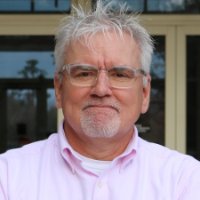The University of Florida Health Cancer Center is pleased to announce that Steven Madore, Ph.D., has been appointed the center’s associate director for core technologies.
In this role, Dr. Madore will be responsible for ensuring the efficient integration of core technologies into all three UFHCC research programs for the purpose of advancing discoveries aimed at the development of new therapeutics for the UFHCC patient population. He will look to improve individual researcher access to existing core technologies, as well as to identify key needs and gaps in the instrumentation and methodology portfolio. Dr. Madore will work closely with core technology groups to obtain new instruments and implement novel methods to meet the needs of the UFHCC research community.
 “Dr. Madore’s vast experience in establishing and managing shared resources developed both in academia and in the commercial sector offers great advantages to our cancer center,” said Jonathan Licht, M.D., director of the UF Health Cancer Center. “We look forward to working with him and the ICBR to leverage the best possible resources to assist our cancer center members in advancing our mission of bringing the best science to the critical problems of our population.”
“Dr. Madore’s vast experience in establishing and managing shared resources developed both in academia and in the commercial sector offers great advantages to our cancer center,” said Jonathan Licht, M.D., director of the UF Health Cancer Center. “We look forward to working with him and the ICBR to leverage the best possible resources to assist our cancer center members in advancing our mission of bringing the best science to the critical problems of our population.”
Dr. Madore’s position is one of several new leadership roles being added to the UF Health Cancer Center roster. The revamped leadership team and Dr. Licht will work with clinical, population science and laboratory-based faculty and staff to develop and implement new and innovative strategies for the treatment and prevention of cancer. These leadership positions are critical in aligning the UFHCC with the center structure required for NCI designation.
“My appointment as the associate director of core technologies is an exciting opportunity to apply my experience in core resource management to support and advance the key aims of the UFHCC research programs,” said Dr. Madore. “Shared resources like the UF Interdisciplinary Center for Biotechnology Research play a critical role in providing cutting-edge technologies to our UFHCC research community. We are well-positioned here at the University of Florida, both in terms of the variety and level of scientific and technical expertise and experience that exist in our core technology groups. I look forward to continuing the contribution that our shared resources make to the UFHCC research mission, and am grateful for the opportunity to contribute to its ongoing goal of achieving national prominence as a leader in innovative cancer research.”
Dr. Madore is an accomplished scientist with a background in molecular biology, genomics and biorepository science. He has served as the associate director for science for the UF Interdisciplinary Center for Biotechnology (ICBR) since 2015; in this role, he oversees core laboratory operations and leads inter-core science development and new technology acquisition.
Dr. Madore received his undergraduate degree in microbiology from the University of Massachusetts-Amherst. He received his doctorate in cellular and developmental biology from the State University of New York Stony Brook and served as a postdoctoral research associate at Duke University School of Medicine under the mentorship of Dr. Bryan Cullen. His work with Dr. Cullen demonstrated that the TAT protein, a key regulator of viral gene expression, recruits host cell protein factors required for activating viral genes.
In 1998, Dr. Madore began working in the pharmaceutical industry at Pfizer in Ann Arbor, MI, where he was responsible for integrating Affymetrix microarray technology into the early stages of drug discovery in oncology, inflammation and dermatology. He joined GlaxoSmithKline in 2007, leading a core technology laboratory using microarray and PCR methodologies in support of drug development in oncology and inflammation.
Prior to joining the ICBR, Dr. Madore spent seven years as the director of biobanking and molecular biology at the Coriell Institute for Medical Research in Camden, NJ. In this capacity, he was responsible for leading operations in biospecimen processing, storage and distribution as well as the oversight of cytogenetics, molecular biology, cell culture and induced pluripotent stem cells laboratories. He was responsible for improving methodologies and implementing automation in several key biospecimen-processing schemes. He also was the PI on a $9.9 million research award from the California Institute for Regenerative Medicine to Coriell for the establishment of the CERM Human Pluripotent Stem Cell Biorepository — a state-of-the-art biorepository for the storage and distribution of human iPSCs.
Dr. Madore is currently on the executive committee of the Southeastern Association for Shared Resources (SEASR), a regional forum for core directors, managers, scientists and technical staff to meet, discuss and collaborate on the many common issues associated with the operation of academic shared resource facilities.
Please join us in welcoming Dr. Madore as he steps into his new role as associate director for core technologies of the University of Florida Health Cancer Center.

